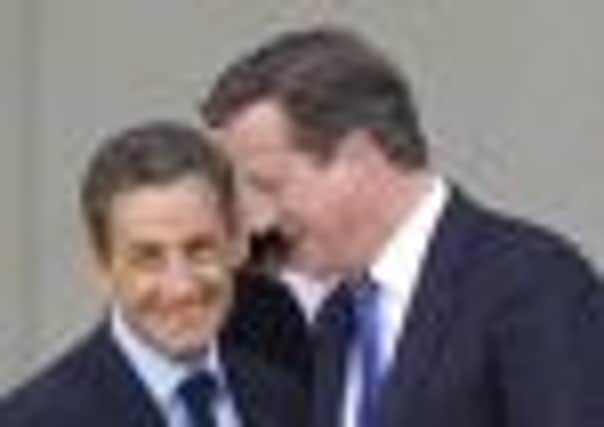Hero’s welcome as Cameron visits ‘free Libya’


Flanked by Libya’s new leadership, Mr Cameron struggled to make himself heard above the roar of more than 1,000 voices who cheered the Prime Minister when he arrived in Benghazi to mark the end of 42 years of Colonel Muammar al-Gaddafi’s dictatorship.
With the French president Nicolas Sarkozy by his side, Mr Cameron said: “People in Britain salute your courage.
Advertisement
Hide AdAdvertisement
Hide Ad“You showed the world you would get rid of a dictator and choose freedom. Colonel Gaddafi said he would hunt you down like rats, but you showed the courage of lions.”
The two western leaders had travelled under tight security to Benghazi to greet the crowds gathered in Liberty Square after talks in Tripoli with the National Transitional Council.
Mr Cameron told his audience: “Your friends in Britain and France will stand with you as you build your country and build your democracy for the future.”
Mr Sarkozy plunged into the crowd, reaching across his bodyguards to shake the hands of waiting Libyans.
French, British and Free Libya flags were waved as the crowds chanted “Thank you, Cameron”.
Yesterday was the first visit to Libya by western leaders since Gaddafi was overthrown last month, and the occasion was seen as an important sign of the progress that has been made since the conflict was at its height.
Before their heroes’ welcome, the two leaders visited the Benghazi Museum of Gaddafi’s Crimes, where they viewed rooms of portraits of the “Martyrs of the Uprising”.
There they were introduced to a six-month-old boy named Sarkozy. His father, Mustafa Bosen, said: “My wife was about to give birth on 19 March and Gaddafi was coming to kill us all. Mr Cameron and Mr Sarkozy decided to save my son’s life, so when he was born on 21 March, we named him Sarkozy and I have brought him here today to thank them both.”
Advertisement
Hide AdAdvertisement
Hide AdAt a joint press conference in Tripoli, Mr Cameron and Mr Sarkozy – the two architects of the international military intervention against Gaddafi – pledged their continuing support for the country.
Less than four weeks after the capital finally fell to anti-Gaddafi rebels, they became the first leaders of countries involved in the air strikes to set foot in what Mr Cameron called “free Libya”.
Standing alongside the head of the National Transitional Council, Mustafa Abdul Jalil, they promised to step up efforts to unfreeze Libyan assets held abroad in order to make them available to the fledgling new government.
Mr Cameron, who was accompanied on the visit by Foreign Secretary William Hague, said Britain would provide assistance in clearing mines and decommissioning dangerous weapons, while Mr Sarkozy said the French would help in rebuilding Libya’s shattered schools.
Mr Cameron acknowledged that “the hardest bit of work is probably still to come” as the country tried to get back on its feet.
Britain and France are now to press for a new United Nations Security Council resolution to enable the release of more assets. Fifty places at specialist hospitals in the UK are to be made available to people needing advanced surgery, prosthetic limbs and rehabilitation for severe injuries, including some hurt by mines left behind after the end of the war.
The UK Border Agency will waive visa requirements for the patients – and one companion each. The treatment will be fully funded by Libya.
Both leaders emphasised the need to ensure that Gaddafi was captured and made to stand trial for his crimes.
Advertisement
Hide AdAdvertisement
Hide Ad“There are still parts of Libya under Gaddafi’s control. Gaddafi is still at large, and we must make sure this work is completed,” Mr Cameron said.
“We must keep on with the Nato mission until civilians are all protected and this work is finished.
“We will help you to find Gaddafi and to bring him to justice and we want to help you to take the dangerous weapons out of Libya.”
Mr Abdul Jalil thanked them for taking “brave positions” during the Libyan uprising.
“They showed us political, economic and military support which helped the rebels establish a state, and we thank France and the UK for that,” he said.
Mr Sarkozy urged Libyans to avoid “vengeance and retaliation”, calling on them to preserve unity and seek reconciliation.
He said France’s focus was on consolidating the position of the NTC and pursuing the last remnants of the Gaddafi regime, rather than focusing on economic deals or reconstruction contracts.
However, Mr Abdul Jalil said Libya’s allies would be given some priority when future contracts are negotiated.
Advertisement
Hide AdAdvertisement
Hide AdThe two leaders had flown into Tripoli airport amid tight security – Mr Cameron arriving on a RAF C-17 transport aircraft.
As Apache helicopter gunships swept across the seafront, they were flown by helicopter to a medical centre in the capital, where they were mobbed by hospital staff before they held their news conference in Tripoli’s Corinthia Hotel.
The improved situation led to the Foreign Office relaxing slightly its previous blanket advice against all travel to Libya.
It suggests “essential travel” is now possible to Tripoli, Zuwarah, Az Zawiyah, al Khums, Zlitan and Misrata, and the coastal towns from Ras Lanuf to the Egyptian border, including Benghazi.